#vulgate
Text
No, Sir Galahad is not in the Bible, and I never said he was.
OK, so in my series of posts and lectures about my work on Neil Gaiman's Chivalry, I pointed out that Sir Galahad's first appearance in Arthurian fiction was in the Vulgate, and that his name was originally spelled Galaad. Therefore the spelling in Neil Gaiman's Chivalry is correct, and Galahad is a later variant spelling.
Someone recently took me to task for saying this meant that I claimed Sir Galahad was in the Bible, and yet Sir Galahad appears nowhere in the Bible.
I never said Sir Galahad was in the Bible.
I said he was in the Vulgate.
Vulgate means "common version" in Latin.
The confusion here stems from the word "vulgate" which often refers to the 4th century Latin translation of the Bible commonly known as the Vulgate Bible.
But "vulgate" is also a term used to refer to The Lancelot-Grail Cycle, a 13th century French Arthurian cycle which is also known as the Vulgate or Vulgate Cycle -i.e. common version. Later translations of this work are known as Post-Vulgate.
Specifically, Galahad or Galaad appears in the Vulgate Queste del Saint Graal.
Happy to help.
Chivalry is available wherever fine books are sold, and you can come see me at the San Diego Comic Con Museum on October 4 where I will be signing and lecturing and showing art. Thanks.
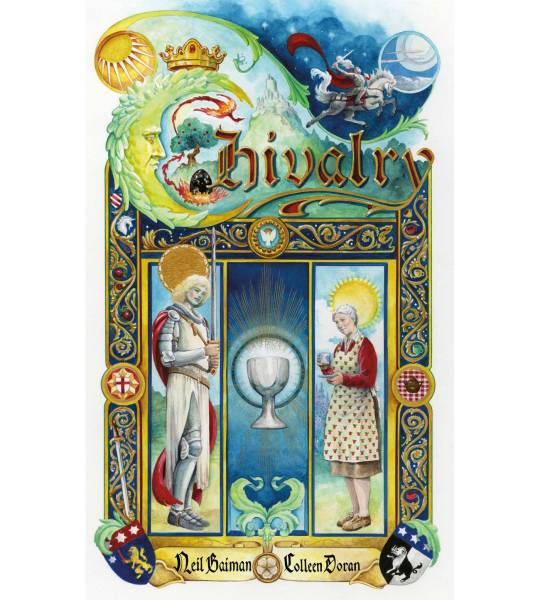
2K notes
·
View notes
Note
Hi! I really want to read the vulgate cycle but I have a hard time staying focused when reading it. Are there any sections of the vulgate that are not as important to the understanding or able to skip? Thank you so much for making all these stories accessible and thanks for your reply :))
Hello my friend! This is a great question and one I get a lot. The Vulgate Cycle is long and daunting, but I can help you navigate it!
Firstly, here is the full Vulgate Cycle PDF collection for everyone to read. Secondly, I'll summarize what you can do, and elaborate below a cut.
TL;DR
If reading a PDF, use CTRL+F to find your favorite character's name/stories.
If reading a physical copy, utilize the index (located at the very end of the Post Vulgate) to find them.
Discover chapters of interest from the summary page (also located at the very end of the Post Vulgate).
Skip The History of the Holy Grail and begin with The Story of Merlin or Lancelot I.
Now, let's break down the ways you can navigate the Vulgate Cycle step by step.
CTRL+F
This option will certainly be less effective if your favorite character is a prominent one such as Lancelot or Gawain as they appear a million times. However, if you want to learn more about someone else, say, the Lady of the Lake, you can search her up and find every instance of her appearance. Like so.
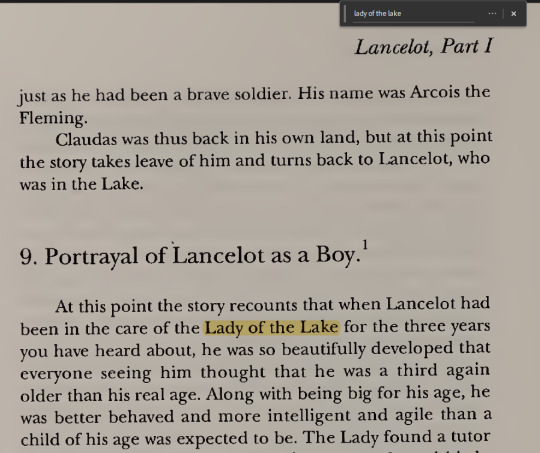
Index
In the very back of the final book of the Post Vulgate, there's an Index listing every named character [Ex: Gawain], location [Ex: Orkney Isles], entity [Ex: Holy Spirit], animal [Ex: Gringalet the horse], and language [Ex: Hebrew] mentioned in the entirety of the Vulgate Cycle. There you'll find a list of which book/chapter/page they appear in. Here are all the mentions of Gawain's horse in The Book of Merlin.

Chapter Summaries
Each book of the Vulgate Cycle has a Table of Contents with the chapter numbers and long, descriptive titles. That alone may give you an indication of what you want to read. However, at the back of the Post Vulgate, right before the Index, there's a list of every chapter in the Vulgate Cycle with a summary of events. That will give you more detail and may help you decide if you want to read in full.
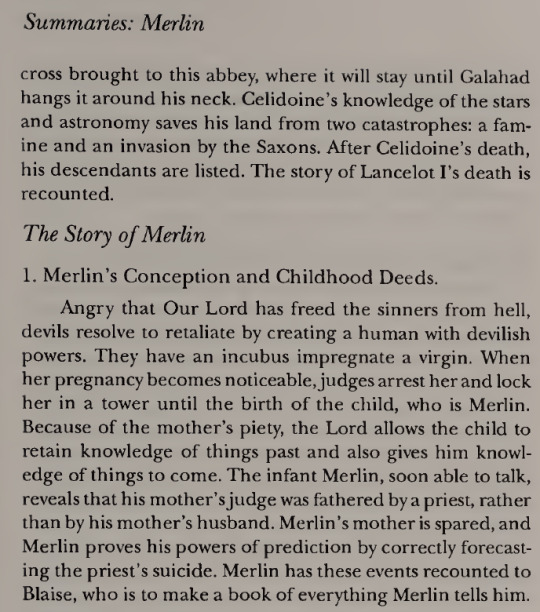
Skip
If it sucks, hit da bricks. The beauty of the Vulgate Cycle is that you don't need The History of the Grail or The Book of Merlin to understand what comes later. I enjoy them because History gives a ton of background to the religious themes the Grail Quest will eventually explore and sets up all the motifs way in advance and Merlin has the Orkney Bros as well as Yvain and Sagramore as kids which is fun. But the fact is you can begin with Lancelot I and you won't be lost. Lancelot I was written first, Merlin is a prequel, so it's optional, and the motifs of the Grail Quest are going to be heavy handed when you get there anyway without the added stuff from History. That's hundreds of pages you can skip if you want to! Norris J. Lacy, the head editor, and his translation team did a phenomenal job with footnotes throughout, so if a character off-handedly refers back to something, you can rely on them to leave a little note at the bottom for you to refresh your memory with. It'll even give you a chapter/page number if you want to refer back yourself. Here's a footnote referring to Agravaine's unnamed amie [his ladylove] who helped wing woman her sister to romance Gawain. That was 4 chapters prior to this moment.
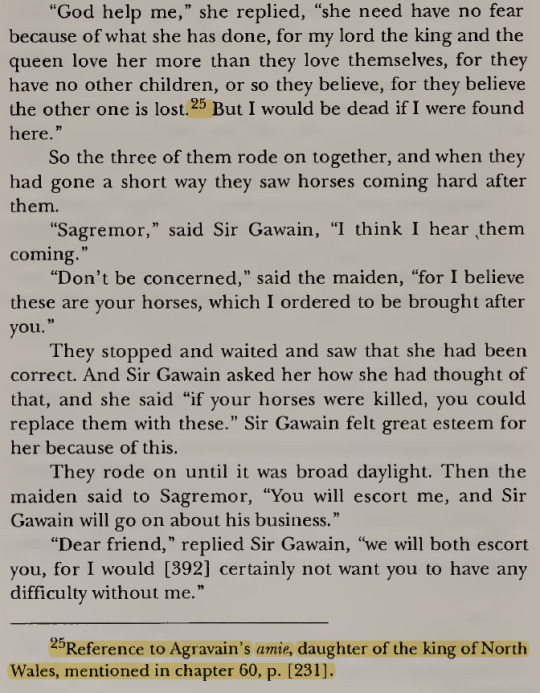
So there are plenty of ways to navigate the Vulgate Cycle and make it more digestible. That being said, it's translated so beautifully by Lacy and his team, that it reads like a modern novel. I have no doubt that once you get started, you'll become invested, and find it much easier to work through than you first thought. It's long-winded and character dense but it's fun. I do hope you're able to read it and understand why I love it so much! Thanks for this ask and I hope this helps. Have a great day!
#arthurian legend#arthurian legends#arthuriana#arthurian mythology#arthurian literature#the vulgate cycle#the vulgate#vulgate#post vulgate#quotes#resource#reading recommendations#my post#ask
73 notes
·
View notes
Text
Reading the Vulgate Cycle and just. Y’all. Everyone. Why does anyone bother with Malory, this is so much better.
As an example. Malory’s Morte d’Arthur, the scene where Lancelot wears Kay’s armor and wreaks some havoc on the way back to Arthur’s court:

It’s so dry. SO DRY. How did he make that boring?
The same scene in the Vulgate Cycle, written 2.5 centuries earlier:
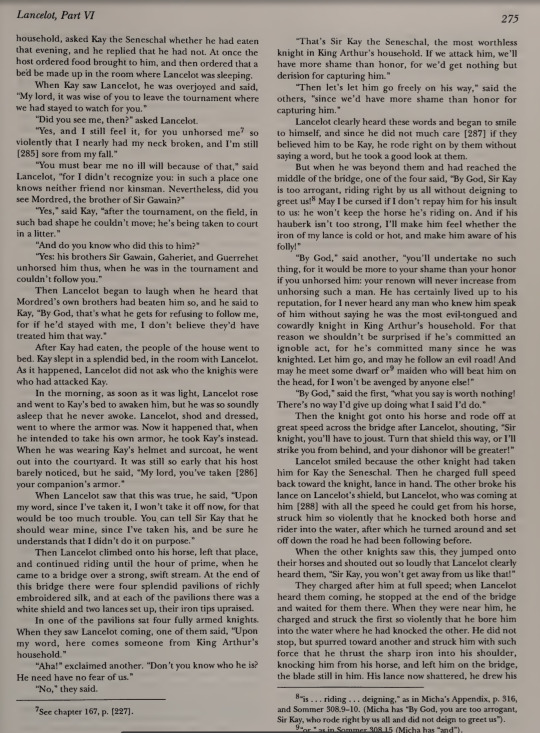
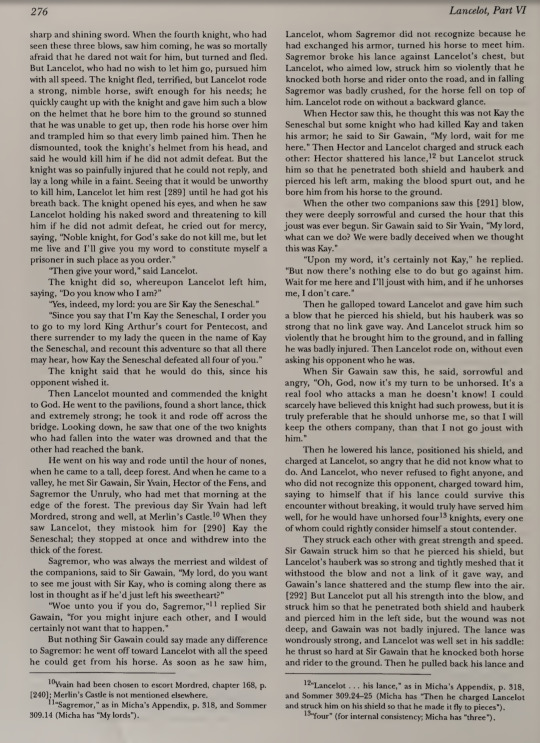
#le morte d’arthur#Thomas Malory#vulgate cycle#vulgate#Arthurian literature#arthuriana#lancelot grail
34 notes
·
View notes
Text
MerGana and How Their Extremism May Follow Vulgate/Robert de Boron's Good vs. Evil Story
I think making bbcMorgana's first acts in S3 and S4 of saying that it was good that women and children of camelot will die was a fascinating and deliberate choice of making sure she was ireedemable and "evil" in the eyes of the audience.
The framing of bbcMorgana as killer of innocents (even when she was just following bbcMorgause's orders) in juxtaposition of bbcMerlin as vigilante executioner of treasonous criminals makes the audience lean more favorably towards bbcMerlin's extremism.
Writing bbcMorgana as one who takes pleasure in the suffering of others also enabled the producers to makes sure that the audience can forgive bbcMerlin's own crimes because he does it with obvious anguish.
............
Points to consider though:
BbcMorgana was educated for one year that what she was doing was right and justified. Based on her intimate knowledge if the peopleof Camelot, they are all complicit in the deaths of millions of the magic race and their allies. Her extremist training under bbcMorgause amplified that drive to punish all and then rejoice in their downfall. The bbcMorgana who cared for the wellbeing of Camelot already died when she was executed without trial and due cause (basically assassinated) for the sake of the Kingdom. (Remember, hemlock has no antidote)
BbcMerlin's extremism allowed him to bypass laws that even Camelot held dear. But since he does this with anguish, sorrow and burden of destiny/god's will then, he is forgiven and justified by the watchers of his acts even though he usually held the metaphorical gun at point blank range and then called it "self-defense"
............
I would say the merlinbbc show matches with the way The Story of Merlin was written in Robert de Boron tradition and the Vulgate. The clear distinction between good and evil in these classic literature was always "light and dark", "hatred and love."
Commiting heinous acts in "wrath, bitterness and revenge" "and taking pleasure in suffering" was the "work of the devil" "letting the devil into one's heart" (as the case of vulgate!merlin's conception)
And committing heinous acts while in anguish is technically acceptable in the eyes of destiny and the christian god. (As was the case of robertdeboron!merlin assisting in arthur's and ector de maris's conception)
...........
Then there is an argument that the show followed the heavily christian vulgate philosophy of good and evil all along?
That other philosophies and ideas which revolve around good/evil, light/dark, hatred/love being in constant balance should not be applied to the show because classic arthuriana doesnt use them?
..................
Redemption, also leans on the idea of bbcMerlin spreading the "good word" to the others. That the unbelievers will be saved if they join him in backing the One and Only Savior and King. If they don't and if they fight against it then there will be a judgement. It is never the other way around despite the unbelievers also having valid justification. As expected this reflects the highly christian messaging of the classic source material too.
Then if other watchers lean/sympathise more towards the motivations and actions of the "antagonists," "the unbelievers," "members of the old religion that fight against the prophecy" then they are "letting evil prevail" and "you dont understand the objective of the story"
Would it also mean that such antagonist-sympathetic fandom wank are technically not worth rehashing because it would be too rooted in actual historicity/real life instead of the classic arthurian mythology and christian influences that the show was based on?
.............
Anyhow the next time you hear people saying that the merlin bbc writers were stupid and didnt know what they were doing, please reconsider.
#otp: hatred to your love#otp: darkness to your light#vulgate#prose merlin#on how merlin bbc follows classical arthuriana: good vs evil#thots#heli blobbing#merlin meta#natural dyad#its an extremist vs extremist game#ultimately this was written as a mergana dynamic thing#theyre both terrible your honor
7 notes
·
View notes
Text
Our next #SIMSSeries is Ms. Codex 236, an early 13th century French Vulgate Bible with prologues by Jerome. It's bound in an 18th-century French brown morocco binding with clasps. Especially notable for its blue, green, and red penwork initials.
Online: bit.ly/3cwmDLp
#medieval#manuscript#illuminated manuscript#13th century#penwork#initials#bible#france#vulgate#binding#clasps
98 notes
·
View notes
Text
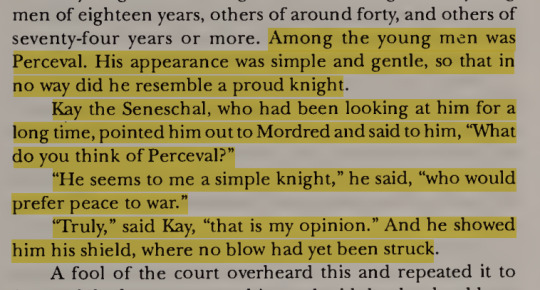
kay asking mordred what he thinks of percival i'm being fed scraps right now
#cain.txt#percival#sir percival#kay#sir kay#mordred#sir mordred#persimmon#mordred/percival#i'm looking at this with yaoi goggles my bad#arthuriana#knights of the round table#arthurian literature#i also love mordred and kay being friends lmao it just makes sense#vulgate
5 notes
·
View notes
Text
I’m gonna learn Latin to read the vulgate I need to know what all the fuss is about
6 notes
·
View notes
Text
I do know that if I were the winner and ought to cut off his head, I should not be able to kill him for all the world, because I think he is too noble. Moreover, he is the man, out of all those in the world that have meant anything to me, that I have most loved, and still do

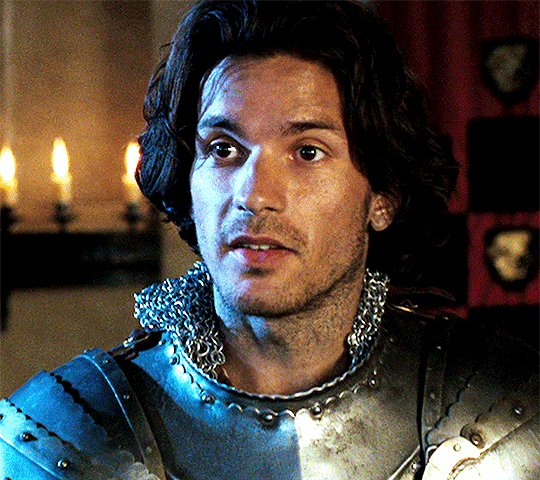
–Lancelot about the fight with Gawain —Vulgate
3 notes
·
View notes
Text
SAINT OF THE DAY (September 30)

Saint Jerome — the priest, monk and Doctor of the Church renowned for his extraordinary depth of learning and translations of the Bible into Latin in the Vulgate — is celebrated by the Church with his memorial today, September 30.
Besides his contributions as a Church Father and patronage of subsequent Catholic scholarship, Jerome is also regarded as a patron of people with difficult personalities — owing to the sometimes extreme approach, which he took in articulating his scholarly opinions and the teaching of the Church.
He is also notable for his devotion to the ascetic life and for his insistence on the importance of Hebrew scholarship for Christians.
Born around 340 as Eusebius Hieronymous Sophronius in present-day Croatia, Jerome received Christian instruction from his father, who sent him to Rome for instruction in rhetoric and classical literature.
His youth was thus dominated by a struggle between worldly pursuits, which brought him into many types of temptation and the inclination to a life of faith, a feeling evoked by regular trips to the Roman catacombs with his friends in the city.
Baptized in 360 by Pope Liberius, Jerome traveled widely among the monastic and intellectual centers of the newly Christian empire.
Upon returning to the city of his birth, following the end of a local crisis caused by the Arian heresy, he studied theology in the famous schools of Trier and worked closely with two other future saints, Chromatius and Heliodorus, who were outstanding teachers of orthodox theology.
Seeking a life more akin to the first generation of “desert fathers,” Jerome left the Adriatic and traveled east to Syria, visiting several Greek cities of civil and ecclesiastical importance on the way to his real destination:
“A wild and stony desert ... to which, through fear or hell, I had voluntarily condemned myself, with no other company but scorpions and wild beasts.”
Jerome's letters vividly chronicle the temptations and trials he endured during several years as a desert hermit.
Nevertheless, after his ordination by the bishop of Antioch, followed by periods of study in Constantinople and service at Rome to Pope Damasus I, Jerome opted permanently for a solitary and ascetic life in the city of Bethlehem from the mid-380s.
Jerome remained engaged both as an arbitrator and disputant of controversies in the Church.
He served as a spiritual father to a group of nuns who had become his disciples in Rome.
Monks and pilgrims from a wide array of nations and cultures also found their way to his monastery, where he commented that “as many different choirs chant the psalms as there are nations.”
Rejecting pagan literature as a distraction, Jerome undertook to learn Hebrew from a Christian monk who had converted from Judaism.
Somewhat unusually for a fourth-century Christian priest, he also studied with Jewish rabbis, striving to maintain the connection between Hebrew language and culture, and the emerging world of Greek and Latin-speaking Christianity.
He became a secretary of Pope Damasus, who commissioned the Vulgate from him.
Prepared by these ventures, Jerome spent 15 years translating most of the Hebrew Bible into its authoritative Latin version.
His harsh temperament and biting criticisms of his intellectual opponents made him many enemies in the Church and in Rome, to which he was forced to leave the city.
Jerome went to Bethlehem, established a monastery, and lived the rest of his years in study, prayer and ascetcism.
St. Jerome once said:
"I interpret as I should, following the command of Christ: 'Search the Scriptures,' and 'Seek and you shall find.'
For if, as Paul says, Christ is the power of God and the wisdom of God, and if the man who does not know Scripture does not know the power and wisdom of God, then ignorance of Scriptures is ignorance of Christ."
After living through both Barbarian invasions of the Roman empire and a resurgence of riots sparked by doctrinal disputes in the Church, Jerome died in his Bethlehem monastery in 420.
3 notes
·
View notes
Photo

college accommodation trying to kick me out via a polite email:
#vulgate cycle#vulgate#lancelot grail cycle#lancelot du lac#lancelot lord of the distant isles#arthurian lit#arthurian legend#arthurian literature#arthur#arthur pendragon#galehaut#gahcelot#gawain#gawaine#king arthur#arthuriana
14 notes
·
View notes
Text
L!bér@larmisme & L¡bér@ltruisme
Carey anima l’un des rares salons américains, auquel tous les noms importants du pays se faisaient un devoir d’assister, y compris R. W. Emerson et le futur président Grant. Il dénonçait la déflation engendrée par le retour à l’étalon-or ainsi que la dépendance dans laquelle étaient restés les anciens esclaves à qui on n’avait pas concédé des terres.
Carey, en bref
Lorsque Carey se retira de l’entreprise d’édition léguée par son père en 1835, il se consacra à l’économie politique et aux affaires publiques, à titre de citoyen privé, pour devenir l’un des plus influents économistes aux États-Unis avant la guerre civile. En plus d’être un auteur prolifique avec 13 livres, 3000 pages de pamphlets et probablement le double en articles dans…

View On WordPress
#besoin#biais cognitifs#caractère#comportement#conviction#croyance#doxa#faits alternatifs#foule#Gustave Le Bon#illusions#jugement#mentalité#milieu#opinion#pensée#populaire#prestige#propagande#Psychologie#religion#satisfaction#sentiments#Sociologie#sophisme#vulgate
0 notes
Note
hello. i was wondering sumn. what makes a knight of camelot ~A Knight of Camelot~? there are so many of them and they’re all different but do they have characteristics in common that are found in the average Famous Knight of Camelot and that when you see you think “ah yes that is very arthurian of them”. i hope my question is not a bother to you and too confusing.
Hi! Like every other answer I ever give, it’s highly dependent on the text.
In the Mabinogion, Arthur’s best knights tend to have special abilities, even magical powers. We all remember Kai’s fun list of attributes.
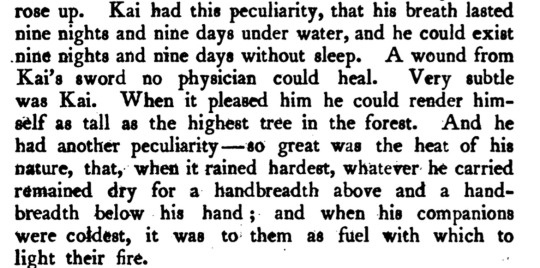
But generally speaking, fame in Camelot comes from 3 things:
Every successful knight is hot. I don’t make the rules.
They have to be good at beating the snot out of other guys. Obviously.
Branding. I’m so serious.
My basis for this comes from the Vulgate descriptions of the Orkney Bros. Specifically, Gaheriet/Gaheris. Not because he’s famous, but because he isn’t.


It’s no accident that Gaheris never makes it to the big screen the way his brothers do. He is, by design, basic. The quintessential middle child. He doesn’t have a Special Trait (such as Gawain’s courtesy or reputation as a ladies man or noontime powers etc.) and that makes Gaheris forgettable. To be a famous knight, you gotta put your whole pussy into it, in front of a live studio audience, or you won’t be famous no matter how good you are. Makes sense when you think about it!
Not sure if that answers your question, but that’s what I got. Take care. :^)
#arthurian legend#arthuriana#arthurian legends#arthurian mythology#arthurin literature#the mabinogion#mabinogion#the vulgate#vulgate#vulgate cycle#kay#sir kay#gaheris#sir gaheris#quotes#my post#ask#anonymous#it’s not lost on me the irony that i used unfamous knights as my receipts lmao
66 notes
·
View notes
Text
Mount Ararat: Where is Noah's Ark, Then? - Historic Mysteries
Mount Ararat is now located in the modern day country of Turkey. This mountain is still regarded as sacred.
https://www.historicmysteries.com/mount-ararat/

View On WordPress
#11th century#1829#1915#1918#Armenia#Armenian Genocide#Armenian Highlands#bible#Book of Genesis#Friedrich Parrot#Hebrew#Khachatur Abovian#Middle East#Mount Ararat#Noah&039;s Ark#Old Testament#Ottoman Empire#Turkey#Urartu#Vulgate
1 note
·
View note
Text
This is why this story forbids anyone ever to flee other people, for the devil abides more often with a man by himself than in a crowd.
Lancelot-Grail, Story of Merlin
...............
"No man is an island," Merlin version.
9 notes
·
View notes
Text
wonderful history of how the Geneva Bible morphed into the Bishop's Bible and finally the King James version:
"However, the Geneva Bible was hated by both the nobility and the Church. The problem was those pesky marginal notes and cross-references! They were critical of the growing problem of slavery; an issue for English ship captains who were beginning to make money transporting slaves from Africa to the Spanish and Portuguese colonies in South America. The notes criticized the clergy, supporting the idea of lay elders rather than only a professional class. They were also critical of the Pope, and worst of all, they were against the divine right of the king to rule.
The only solution was to block it. In 1568, the Bishops Bible was published. Although partially using the Tyndale work, it mostly translated from the Latin Vulgate. It contained numerous errors and had to be revised more than 50 times over the next few years. Though it incorporated the chapter and verse breaks of the Geneva, its multiple errors and revisions were too problematic. The Geneva remained popular, and despite many reprints, the Geneva did not require any revisions. When James ascended to the throne of England, he came with the opinion that God gave him the throne and that his right to rule was an absolute divine right. The Geneva stood in his way. Maybe the people listened to the clergy preach from the Bishops Bible, but at home they read the Geneva, taught their children from the Geneva, and discovered the errors of the church by studying the Geneva.
Consequently, James assembled a team of “translators” in 1611. Using the idea that they were not making a new translation, but making a “good one better” (meaning the Bishops Bible), they published the King James Bible. It, too, incorporated the Geneva chapter and verse breaks. It also included the Apocrypha, books the Roman church used, but which had been removed from the Geneva (the 1560 edition did include the books in an “inter-testamental” section). No marginal notes, no cross-references (as late as 1715, some publishers did include at least some marginal notes). It was a publishing failure. The people did not flock to the new Bible, they continued to use the tried and true Geneva. What could the king do? He banned the publishing of the Geneva Bible, and authorized only his new Bible to be published in English. So, from 1616 forward, the Geneva began to fade from history. The King James underwent several revisions, the most important being the removal of the Apocrypha, although it continued to be included in some printings into the 1800’s. All of the KJV printings prior to 1666 contained the Apocrypha, and the inclusion of it ended entirely in 1826 - for cost-savings, not because it does not belong!"
#God#Christ#Jesus#Bible#King James#William Tyndale#Martin Luther#Bishop's Bible#Geneva Bible#Vulgate#King James version#intertestamental#apocrypha#deuterocanon
0 notes
Text
Our last post for the #SIMSseries on Ms. Codex 236, a final close-up on the small colored initials, alternating blue and red across the page, and the penwork that draws it all together. Ms. Codex 236 is a 13th c. Vulgate Bible copied in France.
Online: bit.ly/3cwmDLp
38 notes
·
View notes